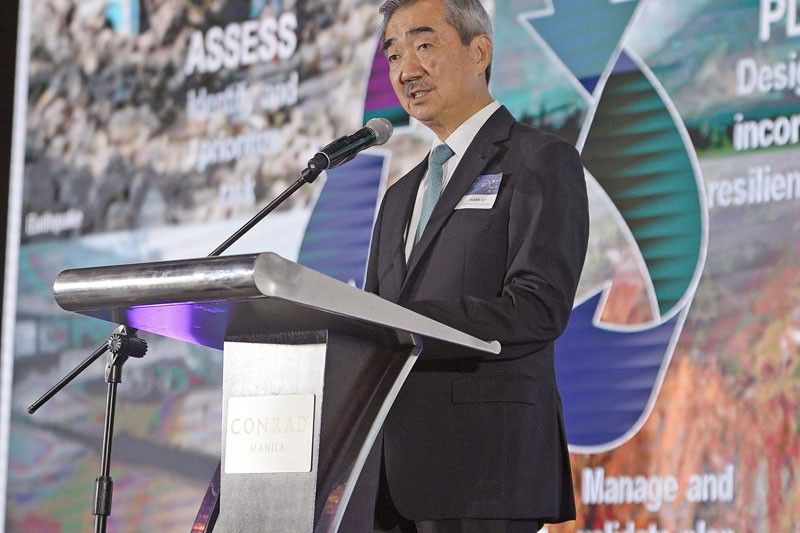Urban resiliency: Key to sustainability in 21st century Philippines

Filipinos have direct experiences with the devastating effects of climate change.
According to the UN Office for Disaster Risk Reduction (UNDRR), the Philippines ranks fourth among countries worldwide most affected by extreme weather events over a 19-year period, from 1998 to 2017. In terms of disaster risk, the Philippines also ranked high globally – placing third among all other countries, according to the World Risk Report in 2018. Given the archipelagic nature of our country, at least 60 percent of our total land area is exposed to multiple hazards, and as much as 74 percent of our total population – now a little over 100 million – is susceptible to these adverse impacts.
With 25 percent of the people living in Metro Manila, the need to build resilient cities cannot rest on the government alone. The private sector has to do its share in building critical infrastructure to help communities thrive above the effects of climate change.
This became very apparent to me when I saw one of our malls in Pangasinan go under the flood along with the whole town during Typhoon Pepeng (international name: Parma). I realized that resilience is important to our stakeholders – our employees, tenants, customers, suppliers and communities surrounding our malls. I was determined to help our stakeholders bounce back better and stronger.
In the Philippines, the private sector contributes a majority of capital investment on facilities for safety and security, transportation, communication and other services like power and water. As such, private-private public partnership plays a vital role in ensuring the sustainability of cities by ensuring their resiliency against disasters and climate threats.
The private sector can share the role in adopting responsible and sustainable business practices. In particular, businesses should take a closer look at integrating disaster risk reduction into its business models and processes.
In SM, we need a holistic approach to disaster resilience.
First, we integrated disaster risk reduction in our malls, allotting 10 percent of our capital expenditure to disaster resilient features in the design and construction. We employ disaster risk management methods such as risk assessments, early warning systems, business continuity management systems and continuous efforts for capacity building.
With each event, we have had to assess the impact of climate change against what we prepared for such as during Typhoon Ondoy (international name: Ketsana) and other typhoons, where the higher design elevation of the Mall of Asia complex proved able to withstand the large waves and storm surges. For our future developments, we are using peak disaster events based on data reaching back 100 years or more and providing for buffers even beyond that.
In our malls and property developments such as offices, not easily apparent features such as energy efficiency, waste management and even traffic control measures create substantial positive impact in the overall environmental sustainability and safety of our operations. This in turn contributes to the collective sustainability of the communities we are located in.
Secondly, we had to develop the resilience of our stakeholders especially our tenants. In order to help our tenants and locators preserve data integrity that is vital to their business operations, we have built the first SM Resilience Center in SM Clark, Pampanga as a centralized data and digital information hub and repository. We currently provide free data storage of five gigabytes for around 1,600 SMEs from all around the country that serves as a vital backup during disaster recovery and business continuity. As a result, SMEs can access digitized copies of their contracts, permits, policies and other important documents to help them bounce-back better after a business disruption.
Our malls have also evolved to serve as the modern-day version of the town plaza where residents of our communities gather and converge. Recognizing that our malls are resilient structures that can offer refuge in times of calamities, SM pioneered community services such as free parking and basic shelter during extraordinary natural disasters.
Thirdly, an important approach toward urban resiliency is multi-sectoral cooperation and collaboration. I have taken an active role in UNISDR’s ARISE, a private sector alliance that promotes collaboration towards disaster risk reduction. In support of our commitment to UN ARISE, we engaged with the public sector, in partnership with other colleagues in the business community.
Among the partners we work with are the National Resilience Council, APEC Emergency Preparedness Capacity Building Center, United Nations Office for Disaster Risk Reduction and Global Education and Training Institute, Department of Trade and Industry, and many others. These partnerships not just directly address immediate disaster risk reduction needs but also provide longer-term capacity building and technical assistance to community stakeholders and beneficiaries.
ACHIEVING TRUE RESILIENCE is a COMBINED EFFORT of the government, the private sector and civil society. We in the private sector should do our part in adopting responsible and sustainable business practices to help fortify our urban centers – integrating disaster risk reduction into business models and processes, and making investments that not only translate to financial return but shared value that safeguards the lives and interests of all our stakeholders.
Hans Sy is the chairman of the Executive Committee of SM Prime Holding, Inc. His involvement with the United Nations International Strategy for Disaster Reduction (UNISDR) was first, as a member, the only Filipino, of its Private Sector Advisory Group, and currently, as an international board member of UNISDR “ARISE” – Private Sector Alliance for Disaster Resilient Societies, a platform for businesses to share knowledge and strategies toward investing particularly in disaster resilience and management.
- Latest
- Trending





























